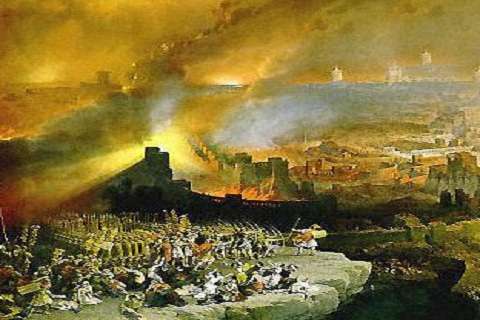 Some readers will be interested in what Martin Goodman had to say about Jewish concepts of the Messiah in the Second Temple era. As much as I’m tempted to add my own comments I will restrain myself. I have written enough of my own perspective on this question other times I have addressed “messianic expecations” (as distinct from messianic speculations). I have replaced endnote numbers with citations.
Some readers will be interested in what Martin Goodman had to say about Jewish concepts of the Messiah in the Second Temple era. As much as I’m tempted to add my own comments I will restrain myself. I have written enough of my own perspective on this question other times I have addressed “messianic expecations” (as distinct from messianic speculations). I have replaced endnote numbers with citations.
. . . There is no evidence of an agreed coherent eschatology within any ancient Jewish group. It is, however, striking that expectation of some dramatic change in the world was so widespread. Even the philosopher Philo, whose interpretation of the Torah generally focused firmly on the psychological need of the individual worshipper to concentrate on the higher meaning of the laws, still let slip an uncharacteristic hope that God would one day bring to an end ‘the enmity of wild beasts which is activated by natural antipathy’ and produce an age in which nature will be at peace:
When that time comes I believe that bears and lions and panthers and the Indian animals, elephants and tigers, and all others whose vigour and power are invincible, will change their life of solitariness and isolation for one of companionship, and gradually in imitation of the gregarious creatures show themselves tame when brought face to face with mankind … Then too the tribes of scorpions and serpents and the other reptiles will have no use for their venom.
Philo did derive a moral message from the analogy between these wild beasts and the wild beasts within the soul, but it seems likely that this idealized picture, so close to the prophecy in Isaiah of the lion lying down with the lamb, owed more than a little to popular conceptions of the perfect time when the last days arrive. [Philo, On Rewards and Punishments 85, 89-90]
In some Jewish texts the central figure in these events of the last days is called the Messiah, ‘the anointed.’ Some texts, like the Psalms of Solomon, describe the Messiah as a human figure, descended from David:
Behold, Lord, and raise up for them their king, the son of David, to reign over your servant Israel in the time which you did foresee, O God. Gird him with strength to destroy unrighteous rulers, and purge Jerusalem from the nations who trample her down to destruction … And he will be a righteous king over them, taught by God. There will be no unrighteousness among them in his days, for all shall be holy, and their king shall be the anointed Lord. [Psalms of Solomon 17:21-22, 32]
In other texts, however, the Messiah is described as a supernatural figure, as befits the events in which he is involved. So the author of 2 Baruch, a description of a series of visions alleged to have been experienced by Baruch, amanuensis of the prophet Jeremiah, but in fact composed by a Jew, probably in Hebrew, in the late first century CE and now preserved only in Christian translations into Syriac and Arabic:
And it will happen after these things when the time of the appearance of the Anointed has been fulfilled and he returns with glory, that then all who sleep in hope of him will rise. And it will happen at that time that those treasuries will be opened in which the number of the souls of the righteous were kept, and they will go out and the multitudes of the souls will appear together, in one sole assembly, of one mind … The souls of the wicked, on the contrary, will waste away completely when they shall see all these things. [2 Baruch 30:1-2, 4]
Among the Dead Sea sectarians are to be found varied and conflicting ideas about the nature of the Messiah. Sometimes the scrolls envisage just one royal, Davidic, triumphant Messiah, but sometimes a Messiah of Israel was contrasted to a Messiah of Aaron, who in turn was differentiated from ‘the Prophet’: Continue reading “Messiahs and Eschatology in Second Temple Judaism”

